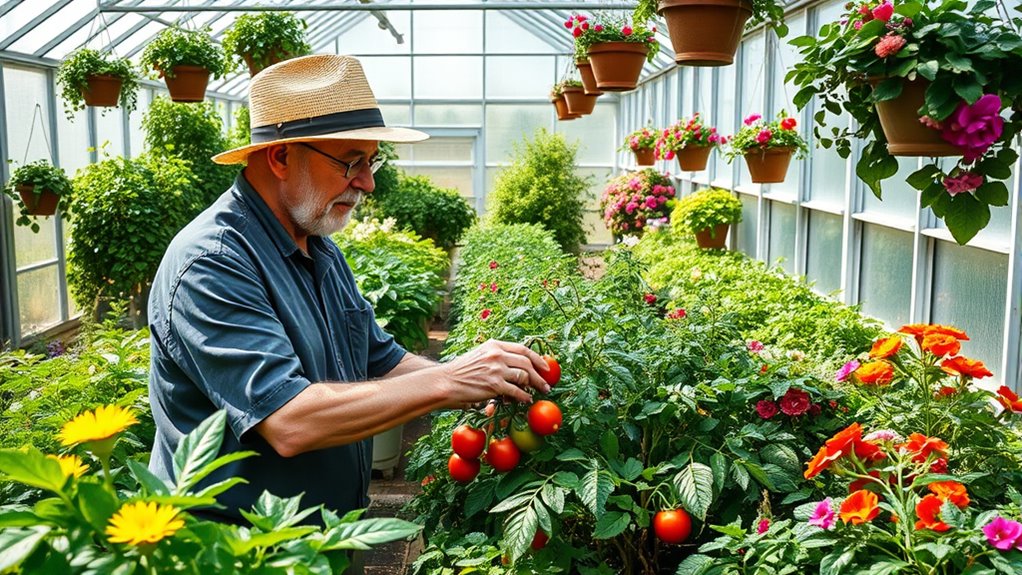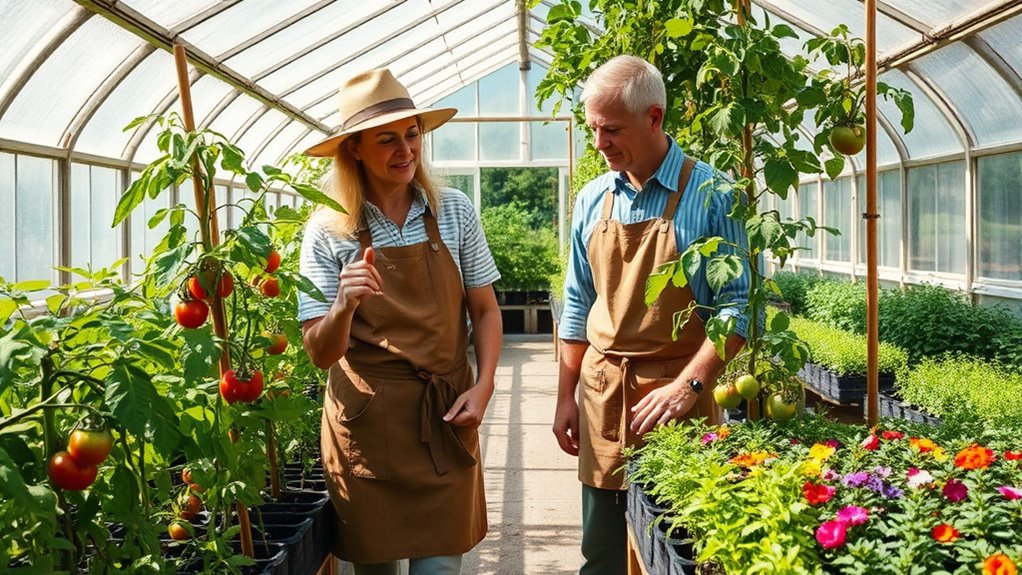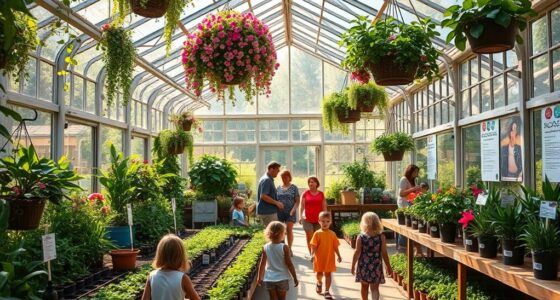Connecting experienced gardeners with new growers creates a supportive environment that boosts confidence and improves success. With a mentor’s guidance, you’ll gain practical skills like seed starting, pest control, and proper watering techniques. Their advice helps you avoid common pitfalls and troubleshoot problems early. This mentorship nurtures sustainable practices and accelerates learning. Keep exploring further, and you’ll uncover even more ways to grow thriving, healthy greenhouse gardens with expert support.
Key Takeaways
- Facilitates knowledge sharing between seasoned gardeners and beginners to enhance greenhouse gardening skills.
- Provides hands-on guidance in seed starting, pest management, and troubleshooting for new growers.
- Encourages development of observation skills and confidence through mentorship and practical experience.
- Connects growers for ongoing support, resource exchange, and problem-solving in greenhouse operations.
- Promotes sustainable practices by sharing techniques on space optimization, watering, and organic pest control.

Have you ever wondered how guidance and support can transform your growth? When you’re just starting out in gardening, especially in a greenhouse environment, it can feel overwhelming. That’s where mentorship makes a real difference. Connecting with an experienced gardener provides you with practical insights that help you navigate common challenges, from seed starting to pest management. An experienced mentor can teach you how to select the right seeds for your climate, how to prepare your soil, and the best techniques for germination. They’ll show you how to create an ideal environment for seedlings, ensuring they get the right moisture, light, and warmth. This hands-on guidance accelerates your learning curve, giving you confidence as you develop your skills.
Guidance from experienced gardeners accelerates learning and builds confidence in greenhouse seed starting and pest management.
Seed starting is a critical stage in greenhouse gardening, and having someone to guide you through it can make all the difference. Your mentor might share tips on how to choose quality seeds, prepare your trays, and use the right soil mixes. They can also advise you on the timing of planting so your seedlings develop strong roots before transplanting. As you gain experience, you’ll learn to recognize when seedlings are ready for the next step, reducing the risk of weak or leggy plants. But seed starting isn’t just about planting; it’s also about managing pests that threaten young plants. An experienced gardener can help you establish pest management strategies early on, teaching you how to spot pests before they become a serious problem and suggesting organic or chemical solutions appropriate for your greenhouse. This proactive approach minimizes crop loss and keeps your plants healthy from the beginning.
Having a mentor also means developing a deeper understanding of the natural balance within your greenhouse. They’ll encourage you to observe plant health closely and to understand the signs of pests, diseases, or nutrient deficiencies. This knowledge helps you take swift action, preventing infestations or illnesses from spreading. Additionally, mentorship fosters confidence—you’ll learn to troubleshoot issues on your own, making decisions based on experience rather than guesswork. Utilizing specialized planters can further support your plant growth by optimizing space and moisture retention, which is especially beneficial for seedling development. Proper watering techniques are also vital; a mentor can teach you how to maintain consistent moisture levels that prevent both overwatering and underwatering, which are common pitfalls for seedlings. Moreover, understanding the cost of home security systems can be useful if you’re protecting your greenhouse equipment and tools from theft or damage.
Furthermore, a good mentor can introduce you to advanced propagation methods that can expand your gardening capabilities and improve your success rate. Ultimately, mentorship in greenhouse gardening isn’t just about learning techniques; it’s about building a supportive relationship that nurtures your passion and competence. With guidance on seed starting and pest management, you’ll develop a sustainable, productive greenhouse operation. The right mentor acts as a catalyst for your growth, turning challenges into opportunities for learning and success. Their support helps you flourish as a gardener, equipped with the skills and confidence to enjoy the rewarding process of nurturing plants from seed to harvest.
Frequently Asked Questions
How Are Mentors and Mentees Paired in Greenhouse Programs?
You typically get paired with a mentor based on your experience level and interests. Mentors are often chosen for their expertise in plant propagation and greenhouse technology. The matching process considers your goals and the mentor’s background, ensuring you receive tailored guidance. This way, you learn practical skills, improve your techniques, and gain confidence in greenhouse management, making your growth journey both effective and enjoyable.
What Are the Costs Involved in Participating in Mentorship Programs?
You might wonder about the costs involved in mentorship programs. Typically, you’ll face program fees, which vary depending on the organization, and material costs for supplies or resources needed for your growth. Some programs offer free participation or sliding scale fees, while others charge upfront. Be sure to ask about all potential expenses so you’re prepared financially, and consider if any materials are included or need to be purchased separately.
How Long Does a Typical Greenhouse Mentorship Last?
Imagine the journey of plant propagation and pest management as a gentle, unfolding story. Typically, a greenhouse mentorship lasts around a season or several months, giving you plenty of time to develop skills. During this period, you’ll gain insights into plant care, troubleshoot pest issues, and refine your techniques. This timeframe helps guarantee you build confidence, making your green thumb flourish with practical knowledge and hands-on experience.
Are There Specific Qualifications to Become a Mentor or Mentee?
When considering qualifications for mentors and mentee prerequisites, you should know that most programs look for experienced gardeners with a genuine enthusiasm for teaching and sharing knowledge. Mentors typically need a proven track record in greenhouse cultivation, while mentees should be keen to learn and committed to growth. No strict credentials are usually required, but a passion for gardening and willingness to participate actively are essential for a successful mentorship.
How Can Virtual Mentorship Sessions Be Effectively Conducted?
Imagine sharing your knowledge across distances, bridging gaps with virtual communication. To conduct effective virtual mentorship sessions, leverage digital tools like video calls, shared screens, and messaging platforms. Keep sessions interactive, set clear goals, and encourage open dialogue. Balancing technology with genuine connection helps build trust, making virtual mentorship as impactful as in person. Embrace these tools to inspire growth and foster confidence in your mentees, no matter where you are.
Conclusion
By sharing your expertise, you nurture new growers and watch them flourish. While your hands tend to the plants, your guidance plants seeds of confidence and knowledge in others. Mentorship isn’t just about passing down skills; it’s about inspiring growth—both theirs and yours. As you give your time, you receive fresh perspectives and renewed passion. In this cycle of learning and teaching, you nurture a community rooted in care, connection, and endless growth.










